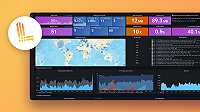Important: This documentation is about an older version. It's relevant only to the release noted, many of the features and functions have been updated or replaced. Please view the current version.
pack
The pack stage is a transform stage which lets you embed extracted values and labels into the log line by packing the log line and labels inside a JSON object.
For example, if you wanted to remove the labels container and pod but still wanted to keep their values you could use this stage to create the following output:
{
"container": "myapp",
"pod": "pod-3223f",
"_entry": "original log message"
}The original message will be stored under the _entry key.
This stage is useful if you have some label or other metadata you would like to keep but it doesn’t make a good label (isn’t useful for querying or is too high cardinality)
The querying capabilities of Loki make it easy to still access this data and filter/aggregate on it at query time.
Pack stage schema
pack:
# Name from extracted data and/or line labels
# Labels provided here are automatically removed from the output labels.
labels:
- [<string>]
# If the resulting log line should use any existing timestamp or use time.Now() when the line was processed.
# To avoid out-of-order issues with Loki, when combining several log streams (separate source files) into one
# you will want to set a new timestamp on the log line, `ingest_timestamp: true`
# If you are not combining multiple source files or you know your log lines won't have interlaced timestamps
# you can set this value to false.
[ingest_timestamp: <bool> | default = true]Examples
Removing the container label and embed it into the log line (Kubernetes pods could have multiple containers)
pack:
labels:
- containerThis would create a log line
{
"container": "myapp",
"_entry": "original log message"
}Loki 2.2 also includes a new unpack parser to work with the pack stage.
For example:
{cluster="us-central1", job="myjob"} | unpackWill automatically unpack embedded labels and log line and replace the log line with the original log line automatically.
More Examples
Use the packed labels for filtering:
{cluster="us-central1", job="myjob"} | unpack | container="myapp"You can even use the json parser twice if your original message was json:
{cluster="us-central1", job="myjob"} | unpack | container="myapp" | json | val_from_original_log_json="foo"Or any other parser
{cluster="us-central1", job="myjob"} | unpack | container="myapp" | logfmt | val_from_original_log_json="foo"


